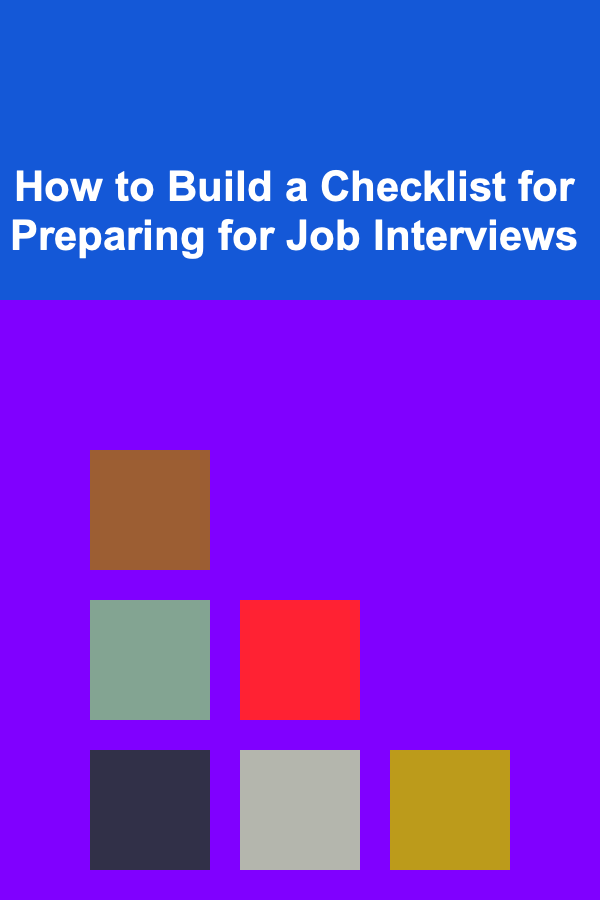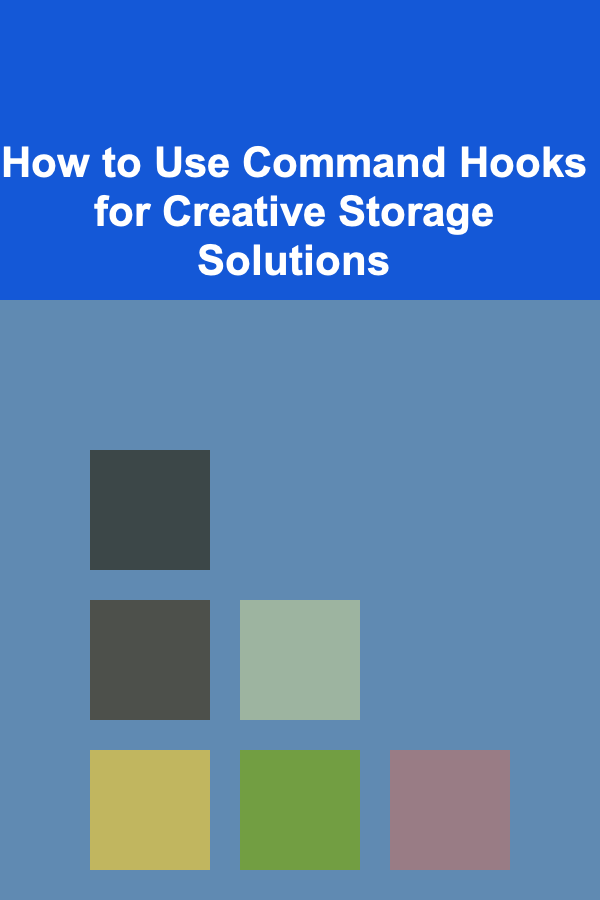
How to Build a Checklist for Preparing for Job Interviews
ebook include PDF & Audio bundle (Micro Guide)
$12.99$11.99
Limited Time Offer! Order within the next:

Preparing for a job interview is one of the most important steps in securing your dream job. It's not just about dressing well and knowing the right answers, but about ensuring that you're thoroughly prepared in all aspects---from research and presentation to mindset and follow-through. Having a comprehensive checklist can keep you organized and focused, making sure you leave nothing to chance.
In this guide, we'll walk you through how to build a detailed checklist for preparing for job interviews, breaking down each step and offering practical tips along the way.
1. Understand the Job and Company
Before diving into the specifics of preparing for the interview itself, it's crucial to understand the position and the company you're interviewing with.
Key Actions:
- Review the Job Description: Carefully read through the job description to understand the role's responsibilities, required skills, and qualifications. Make sure you can articulate how your experience aligns with the job.
- Research the Company: Familiarize yourself with the company's history, values, products/services, and culture. Look for recent news articles, blogs, or press releases about the company. This not only helps you understand the company but also shows the interviewer that you're genuinely interested in their business.
- Understand the Industry: Get a good grasp of the industry the company operates in. Know the key players, trends, and challenges. This will help you understand the bigger picture and provide more insightful answers during your interview.
Tips:
- Try to identify key challenges the company might be facing and think about how your skills could help solve them.
- Familiarize yourself with the company's competitors to better understand its position in the market.
2. Prepare Your Resume and Portfolio
Your resume is your first impression, and it should align with the job you're applying for. Preparing your resume and portfolio should be a key part of your checklist.
Key Actions:
- Update Your Resume: Tailor your resume to highlight experiences and achievements that are most relevant to the job you're applying for. Emphasize skills that match the job description and ensure there are no gaps in your work history.
- Portfolio or Work Samples: If relevant to your field (such as in design, marketing, writing, or software development), compile a portfolio or work samples that showcase your best work. Make sure the samples are high-quality and demonstrate your skills effectively.
- Proofread: Errors on your resume or portfolio can hurt your chances. Check for any spelling or grammatical errors and ensure the formatting is clean and professional.
Tips:
- Make sure your LinkedIn profile and any other professional online profiles (e.g., GitHub for developers) are up-to-date and reflect your resume.
- If your portfolio is digital, ensure the links work and it's easy to navigate.
3. Prepare Answers to Common Interview Questions
Anticipating and preparing for common interview questions can make you feel more confident and composed when the actual interview takes place.
Key Actions:
- Behavioral Questions: Prepare answers for behavioral interview questions, which often start with "Tell me about a time when..." or "Give me an example of...". Use the STAR method (Situation, Task, Action, Result) to structure your responses.
- Strengths and Weaknesses: Be ready to discuss your strengths and how they'll help you succeed in the role. When discussing weaknesses, focus on areas you've actively worked to improve.
- Why You Want to Work There: Prepare a compelling answer to the question, "Why do you want to work at this company?" Tie your skills, values, and interests to the company's mission and culture.
- Salary Expectations: While it's best to wait for the interviewer to bring up salary, it's good to have a range in mind. Research the typical salary for the role in your location to ensure you're asking for a competitive rate.
Tips:
- Practice your answers out loud in front of a mirror or with a friend. The more you practice, the more confident you'll become.
- Avoid memorizing your answers verbatim---focus on key points to ensure your responses sound natural and conversational.
4. Prepare Questions for the Interviewer
Job interviews are a two-way street. You should also be prepared to ask insightful questions that demonstrate your interest in the role and company.
Key Actions:
- Company Culture: Ask about the company's work culture, leadership style, and team dynamics. For example, "How would you describe the work environment here?" or "What's the leadership style of the team I would be joining?"
- Growth Opportunities: Inquire about career development and growth opportunities. "How does the company support professional development?" or "What opportunities for advancement exist within this department?"
- Job Specifics: Ask about the day-to-day responsibilities of the role to ensure there are no surprises. Questions like, "What does success look like in this role?" or "What are the immediate challenges the person in this role will face?" can help clarify expectations.
Tips:
- Make sure your questions reflect research you've done on the company and the role. Avoid asking questions that can easily be answered through a simple Google search or the job description.
- Don't ask about salary or benefits too early in the interview process unless the interviewer brings it up.
5. Perfect Your Professional Appearance
Your appearance plays a significant role in how you're perceived during an interview. Dressing appropriately can demonstrate professionalism and respect for the company's culture.
Key Actions:
- Dress Appropriately for the Role: Choose an outfit that is suitable for the industry and the company's culture. In more traditional fields (like finance or law), business formal is typically expected. In more creative or tech-related roles, business casual might be more appropriate.
- Grooming and Hygiene: Ensure your hair is neat, your nails are trimmed, and your clothes are clean and wrinkle-free.
- Comfort and Confidence: Make sure that you're comfortable in your attire. If you're uncomfortable, it may show through in your body language.
Tips:
- Do a quick check of your outfit before you leave. Look for anything that might need adjustment, like a loose button or misplaced accessory.
- Avoid excessive jewelry or strong fragrances.
6. Prepare for Virtual Interviews (if applicable)
As remote interviews become increasingly common, it's essential to be prepared for virtual interviews as well.
Key Actions:
- Test Your Technology: Ensure your computer, camera, microphone, and internet connection are working correctly before the interview. Test any video conferencing software (Zoom, Skype, etc.) ahead of time to avoid last-minute technical issues.
- Choose a Quiet, Well-Lit Space: Set up in a quiet room where you won't be interrupted. Ensure the background is clean and free from distractions. Good lighting can make a huge difference in how you appear on camera.
- Dress Professionally: Even if you're interviewing from home, treat it as you would an in-person interview. Dress professionally from head to toe (yes, that means wearing pants or a skirt, not just a nice top).
Tips:
- Have a backup plan in case of technical difficulties. Be ready to switch to your phone if your internet connection fails.
- Practice using the video platform to get comfortable with the interface and features (muting, sharing screen, etc.).
7. Mindset and Mental Preparation
Beyond the physical and logistical preparation, mental preparation is just as crucial. The right mindset can make the difference between a successful and unsuccessful interview.
Key Actions:
- Stay Positive and Confident: Remind yourself of your strengths, accomplishments, and why you're a great fit for the role. Confidence can be a key factor in impressing your interviewer.
- Stay Calm: Interviews can be stressful, but taking deep breaths, staying calm, and maintaining a positive attitude will help you perform at your best.
- Visualize Success: Spend a few minutes visualizing yourself performing well in the interview. Imagine walking in confidently, answering questions thoughtfully, and leaving a lasting impression.
Tips:
- If you're nervous, take a few deep breaths before the interview to calm your nerves.
- Focus on the conversation rather than worrying about the outcome. The more relaxed you are, the more likely you'll be able to showcase your skills effectively.
8. Follow-Up After the Interview
Once the interview is over, the preparation doesn't stop. Following up is an important part of the process.
Key Actions:
- Send a Thank-You Note: Within 24 hours of the interview, send a thoughtful thank-you note or email. Express gratitude for the opportunity, reiterate your interest in the role, and highlight one or two key points from the interview.
- Follow Up: If you haven't heard back after the specified time frame (usually one to two weeks), it's appropriate to send a polite follow-up email to inquire about the status of your application.
Tips:
- Keep your thank-you note brief and professional, and avoid sounding overly eager or desperate.
- If you were interviewed by multiple people, send individual thank-you notes to each person.
Conclusion
By building a comprehensive checklist for preparing for job interviews, you ensure that you're well-prepared, confident, and ready to present your best self to the interviewer. From researching the company and role to preparing your answers and presenting yourself professionally, each step plays a crucial part in your overall success. Follow these actionable steps, and you'll be on your way to acing your job interview and landing the role you want.

How to Organize Your Home for Stress-Free Mornings
Read More
How to Organize Your Online Accounts and Passwords
Read More
How to Set Up a Family Scrapbooking Station for Memories
Read More
How to Use Command Hooks for Creative Storage Solutions
Read MoreHow to Use Digital Tools for Effective Time Tracking
Read More
Strategic Sustainability Leadership: A Practical Approach for Managers in the Era of Climate Change
Read MoreOther Products

How to Organize Your Home for Stress-Free Mornings
Read More
How to Organize Your Online Accounts and Passwords
Read More
How to Set Up a Family Scrapbooking Station for Memories
Read More
How to Use Command Hooks for Creative Storage Solutions
Read MoreHow to Use Digital Tools for Effective Time Tracking
Read More